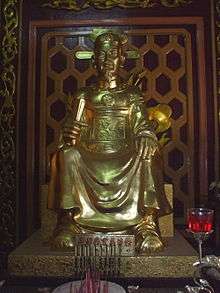Ngô Thì Nhậm

Ngô Thì Nhậm (吳時壬, 1746–1803) was an important Vietnamese scholar and official who served several regimes during the turbulent last decades of the eighteenth century. He had served as an official for the Trịnh Lords before losing his position as a result of a coup that followed the death of the Trịnh Lord, Trịnh Sâm in 1782.
He retreated from public life, focusing on his scholarship, before being lured back to official service by the Tây Sơn leader, Nguyen Hue in the late 1780s. He served the Tay Son regime with enthusiasm during the reign of the Quang Trung Emperor (r. 1788-1792), writing edicts for the Tây Sơn court, and serving as an emissary to the Chinese court.
After the unexpected death of the Quang Trung Emperor and the ascent to the throne of an underage son, Ngô Thì Nhậm slowly decreased his service to the court, and turned his attention to an interest in Vietnamese Buddhism. He became noted for his writings on Vietnamese Buddhism, and was actively involved in attempting to revive the 13th Century Trúc Lâm ("Bamboo Grove") zen sect, the only native Vietnamese school of Buddhism.[1][2] The revival attempted to harmonize the "Three teachings" of Buddhism, Confucianism and Taoism.[3][4][5] After the defeat of the Tây Sơn by the resurgent Nguyễn family in 1802, Ngô Thì Nhậm was captured and publicly flogged by a vengeful Nguyễn official, dying shortly thereafter from the injuries sustained in the beating.
References
- ↑ Tài Thư Nguyẽ̂n The History Buddhism in Vietnam Vol. IIID.5 2008 Page 210 "Ngo Thi Nham thought that by following the Truc Lam Ch'an sect, he and his comrades would be able to put their ideas into practice and enhance their ... According to Ngo Thi Nham, both doctrines were equally vital for human spiritual life."
- ↑ George E. Dutton, Jayne S. Werner, John K. Whitmore Sources of Vietnamese Tradition 2012 Page 151 "The reemergence of Vietnamese leaders as patrons of Buddhism in the south was followed by a more modest Buddhist revival in the north, where it attracted elite scholars, including Ngo Thi Nham. Ngo Thi Nham became active in reviving the ..."
- ↑ Serguei A. Blagov Caodaism: Vietnamese Traditionalism and Its Leap Into Modernity 2001 Page 2 "When Caodaist movement emerged, the concept of "Three teachings" - Buddhism, Confucianism and Taoism - had an ... Another prominent scholar Ngo Thi Nham also endeavored to harmonize Three teachings."
- ↑ Minh Chi, Văn Tâń Hà, Tài Thu Nguyêñ Buddhism in Vietnam: from its origins to the 19th century 1993 Page 171
- ↑ George Edson Dutton The Tây Sơn Uprising: Society and Rebellion in Eighteenth-century Vietnam 2006 Page 278